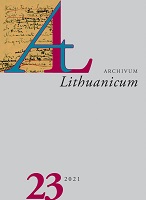Maironio autoredagavimas: neapsisprendimo dėl pakeitimų pernaša
The Self-editing of Maironis’ Late Poetry: the Transport of Indecision over Revisions
Author(s): Dovilė GervytėSubject(s): Lithuanian Literature, Baltic Languages, 19th Century, Theory of Literature
Published by: Lietuvių Kalbos Institutas
Keywords: poetry; "The Voices of Spring";Maironis; 19th century;
Summary/Abstract: The 20th century Lithuanian writer Maironis is known for his collection of poems called The Voices of Spring. It was reprinted five times during the author’s lifetime and contains revisions made by the poet himself. Yet the strongest textual evidence of doubt, rejection, and pondering upon poetical decisions is to be found in the surviving manuscripts (drafts). The reconstructed dynamics of the textual variation within the fragments (a verse or a word phrase) or the segments (a stanza or the whole structure) of seven different poems within those drafts reveal intricate genetic interference between the units of the poems’ texts. The case of self-editing in Maironis manuscripts suggests that the concept of textual variation may be interpreted as the process of transferring the doubt – which concerns the decision whether the textual variant is to be accepted as suitable for the textual situation or to be rejected altogether – within the segments of a particular poem or between its versions, or even different poems (e.g., Vakarop Mintys and Dienų Sielvartai). Based on the macrogenetic analysis of Maironis’ drafts, the former trend of self-editing was called ‘the transport of indecision over revisions’. This concept was concluded by creating models and schemes of the micro- and macrogenetic changes reconstructed from the manuscripts. The interpretative manner of the research – the formation of the avant-texte alongside the application of the analogy of molecular transportation in biochemistry – also inspired the more general reflections. For example, the idea of indecision being transported over revisions helped to consider both the overall dynamics of genetic processes in Maironis’ manuscripts and the individuality of the particular acts of self-editing. As for the latter, the poet tended to edit his works so that the attributes assigned to a particular verse’s subject/object were altered most intensely, changing the semantics to achieve the most metonymical meaning of the verse. Revision of the more rigidly structured works – Maironis’ hymns – contained the indecision as to which of the two works would carry the actual hymn’s name and which would be called its ‘variant’ (as it is in the case of Šv. Aušros Vartų Marijai).
Journal: Archivum Lithuanicum
- Issue Year: 2021
- Issue No: 23
- Page Range: 9-40
- Page Count: 32
- Language: Lithuanian

